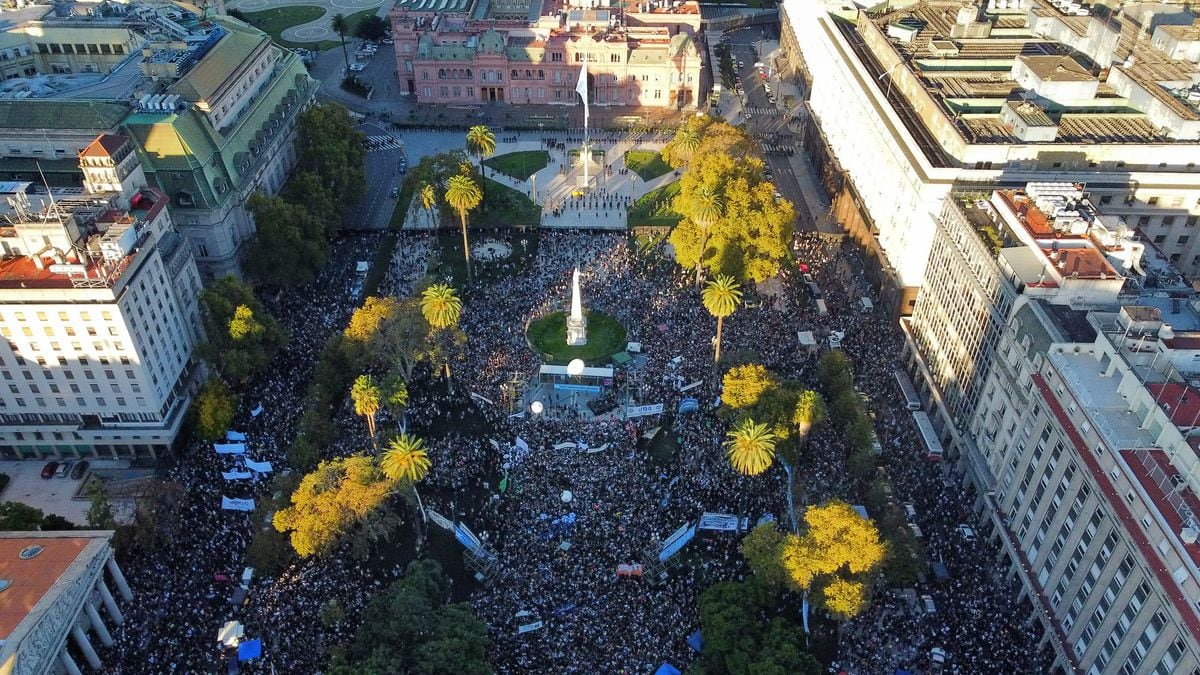The massive marches on Tuesday in defense of the public university in Argentina marked a turning point in the presidential mandate of Javier Milei. During his first four months in power, Milei has made high-impact decisions with the argument of eliminating the fiscal deficit and shrinking the State: he has paralyzed public works, closed state agencies, fired tens of thousands of officials, lowered pensions and salaries. . Each new measure has found detractors and defenders, but the privatization agenda seems to have found its first limit: the public university
In a country cracked by multiple economic crises and political disappointments, free public higher education is one of the few pillars that still stand and to which the lower and middle classes cling to to imagine a better future for their children. The images of classes taught in dark classrooms or outside the faculties due to the lack of funds to pay for electricity have outraged both Peronists and left-wing voters, in the antipodes of Milei, as well as voters from other forces closer to the Government—radicals and macristas—and even repentant milleistas.
The smear campaign launched by the far-right Government has only worsened the situation. Milei accused teachers of indoctrinating and brainwashing students caught, in her reading, in the clutches of socialism. She struck a chord. The president, who graduated in Economics from a private university, did not take into account that in almost every family in Argentina there are stories of people whose lives were changed by public education. His free universities are also a source of admiration in the rest of Latin America, especially in those countries where studying a degree means going into debt for years.
Argentine public universities only have resources to function until July and neither students nor professors know if there will be classes in the second semester. Not even the University of Buenos Aires (UBA), the most prestigious in the country and among the best in Latin America, is free from uncertainty. The reason is that the budget is the same as in 2023, but as inflation approaches 300% year-on-year, the cut is almost 70%. The Executive tried to stop the day of protest last week with the announcement of an alleged agreement that the rectors denied. Government spokespersons said that resources had been allocated to cover administrative expenses for March and April; From the Universities they clarified that the problem is in the freezing of teachers’ salaries, which represent the majority of expenditures.
The Executive did everything possible to disqualify the mobilization. Milei wanted to reduce it to an opposition political act and her Minister of Security, Patricia Bullrich, said that “the same people as always” would demonstrate, referring to social and left-wing organizations. The protest, on the other hand, was massive and heterogeneous like few others since the social outbreak of the corralito crisis of 2001 – 2002. The organizers estimated that 800,000 people marched in the city of Buenos Aires alone, a figure that the police reduced to 150,000. But the diary The nation estimated, based on the analysis of images taken by drones and on the ground, the number of protesters at 450,000. In between there were other milestones, such as the feminist demonstrations against femicides and in favor of legal abortion and the great mobilization of 2017 against a ruling of the Supreme Court that threatened another of the pillars of Argentine democracy: the condemnation of those responsible for the State terrorism of the dictatorship.
The middle class played a leading role in all those large protests and also in this Tuesday’s one. But Milei spent Tuesday retweeting messages from accounts that mocked or attacked protesters. At the end of the day, she posted an image of a lion—the animal she self-identifies with—drinking from a cup that reads “left-handed tears.” Her spokesperson, Manuel Adorni, however, remained silent. The defense of the official position was left in the hands of some representatives of the Pro, the party of former president Mauricio Macri (2015-2019) and today the main ally of the ruling party in Congress. “Partisanship in the defense of education is miserable as well as lying. “I will always defend public education as well as private education,” Jorge Macri, mayor of the city of Buenos Aires and cousin of the former president, wrote on his networks.
Both Milei and Macri have reduced funding for public schools while, in parallel, they launched a financial aid plan for parents who send their children to private schools. In higher education the transfer of resources is more complex. The UBA is one of the best-rated universities on the entire continent and is chosen by students from all social classes. Letting it disappear means, for an impoverished society like Argentina’s, giving up the desire for upward mobility that is increasingly difficult.
Former Peronist presidential candidate Juan Grabois warned Milei that his attack on the public university has generated unprecedented resistance in recent months. “What happened in every corner of the country only happens when something moves the tectonic plates of a society. “Today was the reaction of a people who, if there is one thing that is clear to them, something that neither the most fiery libertine rhetoric nor their undeniable talent for insults can obscure, is that public education is an inalienable right,” Grabois wrote on social networks. he. Milei’s first response, on the same channel, showed the lack of dialogue that reigns in Argentine politics: “Glorious day for the beginning of revelation. Whoever wants to hear (see) should hear (see)… Long live fucking freedom.”
